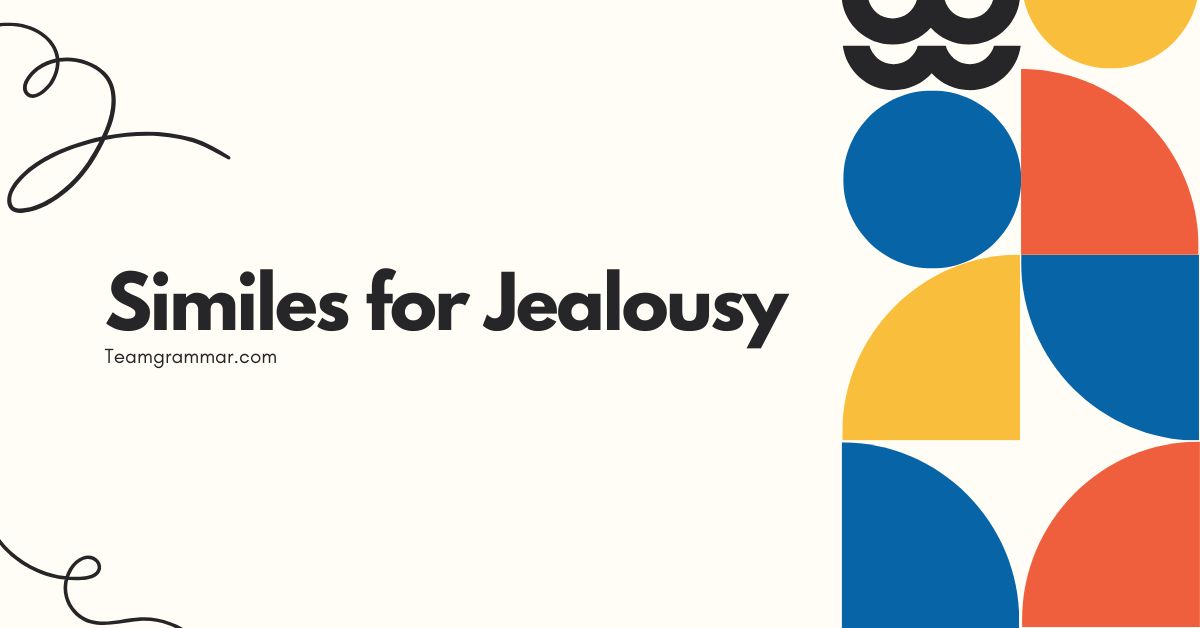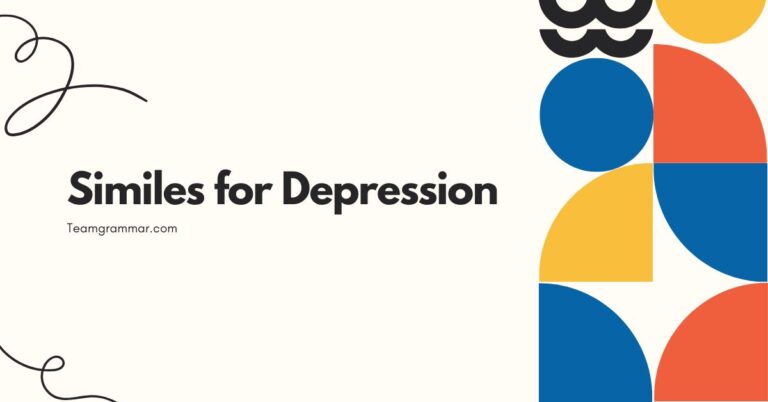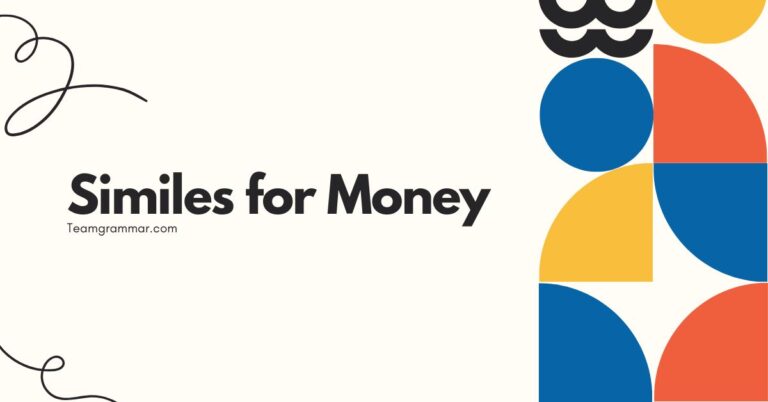39 Similes for Jealousy: Mastering Figurative Language
Understanding similes is crucial for enriching your writing and speech, allowing you to express complex emotions and ideas vividly. Jealousy, a powerful and often nuanced emotion, can be particularly well-conveyed through the use of similes.
This article delves into the world of similes for jealousy, providing you with the knowledge and tools to effectively use them in your communication. Whether you are a student, writer, or simply someone interested in improving your English, this guide will help you master the art of using similes to describe jealousy.
Table of Contents
- Introduction
- Definition of Simile and Jealousy
- Structural Breakdown of Similes for Jealousy
- Types of Jealousy Expressed Through Similes
- Examples of Similes for Jealousy
- Usage Rules for Similes
- Common Mistakes When Using Similes
- Practice Exercises
- Advanced Topics: Nuances and Subtleties
- Frequently Asked Questions
- Conclusion
Definition of Simile and Jealousy
A simile is a figure of speech that directly compares two different things using the words “like” or “as.” It’s a powerful tool for making descriptions more vivid and relatable by drawing parallels between familiar concepts and the subject you’re trying to describe. Similes help to paint a clearer picture in the reader’s or listener’s mind, making the communication more engaging and effective.
Jealousy, on the other hand, is a complex emotion characterized by feelings of resentment, insecurity, and fear of loss, often triggered by a perceived threat to one’s relationships or possessions. It’s a multifaceted emotion that can manifest in various ways, from subtle envy to intense rage.
Understanding the nuances of jealousy is essential for accurately portraying it through language, including the use of similes.
Simile Classification
Similes fall under the broader category offigurative language, which also includes metaphors, personification, and hyperbole. Figurative language deviates from the literal meaning of words to create a more impactful and imaginative expression.
Similes are specifically classified as figures of comparison, as they explicitly draw a comparison between two unlike things.
Function of Similes
The primary function of a simile is toenhance descriptionandclarify meaning. By comparing something unfamiliar to something familiar, similes make abstract concepts more concrete and understandable.
In the context of emotions like jealousy, similes can help to convey the intensity and specific characteristics of the feeling in a way that resonates with the audience.
Contexts for Using Similes
Similes are appropriate in a wide range of contexts, includingliterature,poetry,everyday conversation, andcreative writing. They are particularly useful when you want to add depth and color to your descriptions, evoke a particular mood, or make your writing more memorable.
When describing jealousy, similes can be used to portray the internal turmoil, the outward behavior, or the overall impact of the emotion.
Structural Breakdown of Similes for Jealousy
Similes for jealousy typically follow a simple structure: A is like B, or A is as [adjective] as B. Here, “A” represents the person or thing experiencing jealousy, and “B” represents something that evokes a similar feeling or characteristic.
The connecting words “like” or “as” are crucial for establishing the comparison. The adjective, when used with “as,” further refines the comparison, highlighting a specific quality shared by A and B.
Let’s break down the structural elements with examples:
- Subject (A): The person feeling jealous (e.g., “She,” “His heart,” “The team”).
- Connecting Word: “Like” or “as.” These are the essential components of a simile.
- Object of Comparison (B): Something that embodies or represents jealousy (e.g., “a green-eyed monster,” “poison,” “a clenched fist”).
- Adjective (Optional): A descriptive word that emphasizes a specific aspect of the comparison (e.g., “as green as envy,” “as bitter as gall”).
Here are some examples illustrating the structure:
- She was like a simmering volcano, ready to erupt with jealousy.
- His heart felt as heavy as lead when he saw them together.
- The team’s disappointment was like a dark cloud hanging over their heads, fueled by jealousy of the winning team.
Understanding this basic structure allows you to create your own similes for jealousy, tailoring them to the specific context and nuance you want to convey.
Types of Jealousy Expressed Through Similes
Jealousy is not a monolithic emotion; it can manifest in different forms and intensities. Similes can be used to capture these various nuances.
Here are some common types of jealousy and how similes can be used to describe them:
Romantic Jealousy
This is perhaps the most commonly recognized form of jealousy, arising from a perceived threat to a romantic relationship. It can be triggered by a partner’s interactions with others, real or imagined infidelity, or feelings of inadequacy.
Examples:
- He was as possessive as a dragon guarding its hoard, his jealousy flaring at any hint of attention towards her.
- Her heart twisted like a knife when she saw him laughing with another woman.
- His suspicion grew like a weed, choking the trust in their relationship.
Professional Jealousy
This type of jealousy stems from envy and resentment towards someone’s success or achievements in the workplace. It can manifest as bitterness, competitiveness, or even sabotage.
Examples:
- His ambition burned like a furnace, fueled by jealousy of his colleague’s promotion.
- She watched his career soar like a rocket, her own jealousy a heavy anchor holding her back.
- The office politics were as cutthroat as a jungle, driven by professional jealousy and ambition.
Familial Jealousy
This form of jealousy occurs within families, often between siblings or other relatives. It can be triggered by perceived favoritism, competition for attention, or resentment over unequal treatment.
Examples:
- She felt like the forgotten child, her jealousy a constant ache in her heart.
- His brother’s success was like a shadow over his own life, fueling his familial jealousy.
- Their relationship was as strained as a tightrope, stretched thin by years of sibling rivalry and jealousy.
Social Jealousy
This type of jealousy arises from envy of someone’s social standing, popularity, or connections. It can lead to feelings of inadequacy, resentment, and social exclusion.
Examples:
- She watched them effortlessly navigate the social scene, her jealousy a bitter taste in her mouth.
- He felt like an outsider looking in, his jealousy a wall separating him from their exclusive circle.
- Their popularity was like a magnet, drawing everyone in while he remained on the fringes, consumed by social jealousy.
Examples of Similes for Jealousy
Here are extensive examples of similes for jealousy, categorized to provide a comprehensive understanding of their usage. These examples cover various contexts and intensities of jealousy.
General Similes for Jealousy
These similes can be applied to various situations where jealousy is present, without being tied to a specific type.
The following table contains 30 examples of similes that describe jealousy in a general context. Note the use of “like” and “as” to draw comparisons.
| Simile | Explanation |
|---|---|
| Her jealousy festered like a wound. | Implies the jealousy is painful and worsening. |
| He was as green as envy. | A classic simile indicating strong jealousy. |
| The jealousy gnawed at her like a rat. | Suggests the jealousy is persistent and destructive. |
| It felt like a burning pit in his stomach. | Describes the physical discomfort of jealousy. |
| Her eyes narrowed like a predator’s. | Indicates possessiveness and suspicion. |
| His jealousy was like a dark cloud. | Suggests that jealousy is a burden that is hard to get rid of. |
| She felt as bitter as gall. | Describes the intense resentment caused by jealousy. |
| The jealousy coursed through him like poison. | Implies a toxic and overwhelming feeling. |
| He clutched onto her like a lifeline, fueled by jealousy. | Implies that jealousy is causing him to be overly attached and dependent. |
| Her words dripped with jealousy like venom. | Indicates that the jealousy is expressed in a hostile and malicious way. |
| His jealousy was a simmering volcano. | Suggests that the jealousy is building up and could erupt at any moment. |
| She guarded her position like a hawk. | Implies a possessive and protective attitude driven by jealousy. |
| The jealousy hung in the air like a thick fog. | Suggests that the jealousy is palpable and oppressive. |
| He was as watchful as a sentry, his jealousy on high alert. | Indicates a constant state of vigilance and suspicion. |
| Her heart ached with jealousy like a dull, persistent throb. | Describes the emotional pain and discomfort of jealousy. |
| His jealousy twisted his features into a grotesque mask. | Implies that jealousy is changing his appearance. |
| She felt like an outsider looking in, her jealousy a barrier. | Indicates the feeling of exclusion and resentment caused by jealousy. |
| His jealousy was a wildfire, consuming everything in its path. | Suggests that the jealousy is destructive and uncontrollable. |
| She felt as if she was drowning in a sea of jealousy. | Describes the overwhelming and suffocating feeling of jealousy. |
| He was as suspicious as a detective on a case, driven by jealousy. | Indicates a tendency to investigate and question everything due to jealousy. |
| Her jealousy was a heavy cloak, weighing her down. | Suggests that the jealousy is a burden that is difficult to bear. |
| He felt like a puppet on a string, controlled by his jealousy. | Implies that jealousy is dictating his actions and decisions. |
| She watched them like a hawk, her jealousy keen and watchful. | Indicates a constant state of vigilance and suspicion. |
| His jealousy was a deep-seated resentment, like a buried seed. | Suggests that the jealousy is deeply rooted and likely to grow. |
| She felt as though she was being eaten alive by jealousy. | Describes the intense and destructive feeling of jealousy. |
| He was as protective as a lioness, his jealousy fierce and unwavering. | Indicates a strong and unwavering possessiveness driven by jealousy. |
| Her jealousy was a constant companion, like a shadow. | Suggests that the jealousy is always present and inescapable. |
| He felt like a rejected suitor, his jealousy a bitter pill to swallow. | Implies a sense of disappointment and resentment due to jealousy. |
| She was as envious as a queen dethroned, her jealousy palpable. | Indicates a strong and obvious feeling of jealousy. |
| His jealousy was a burning ember, threatening to ignite. | Suggests that the jealousy is smoldering and could erupt at any moment. |
Romantic Jealousy Similes
These similes specifically describe jealousy within the context of romantic relationships.
The following table presents 30 examples of similes that depict romantic jealousy. Pay attention to how the comparisons relate to relationships and love.
| Simile | Explanation |
|---|---|
| His love turned to jealousy like milk gone sour. | Suggests that love can spoil and become jealousy. |
| She clung to him like a vine, her jealousy suffocating. | Implies possessiveness and a lack of trust. |
| His heart twisted like a knife when he saw them together. | Describes the sharp pain of romantic jealousy. |
| Her suspicion grew like a weed, choking their love. | Indicates that jealousy is harming the relationship. |
| He was as possessive as a dragon guarding its hoard. | Implies an overprotective and controlling attitude. |
| Her jealousy was a wall between them. | Suggests that jealousy is creating distance between the couple. |
| He felt like a replaced toy, discarded and forgotten. | Describes the feeling of being unwanted and unloved. |
| She watched them like a hawk, her jealousy a constant vigil. | Indicates a constant state of suspicion and monitoring. |
| His trust eroded like sand, washed away by jealousy. | Suggests that jealousy is destroying the foundation of the relationship. |
| She felt as if she were competing for his affection, her jealousy a driving force. | Implies a sense of rivalry and insecurity in the relationship. |
| He was as jealous as a lover scorned, his emotions raw and intense. | Indicates a deep sense of betrayal and hurt. |
| Her jealousy was a simmering resentment, threatening to boil over. | Suggests that the jealousy is building up and could lead to a confrontation. |
| He felt like an outsider looking in, his jealousy a painful reminder of his exclusion. | Describes the feeling of being excluded from their intimacy. |
| She clung to him like a drowning person, her jealousy born of fear. | Implies a desperate need for reassurance and security. |
| His jealousy was a dark cloud, obscuring the sunshine of their love. | Suggests that jealousy is overshadowing the positive aspects of the relationship. |
| She felt as if she were losing him, her jealousy a desperate attempt to hold on. | Indicates a fear of losing the relationship and a desire to control it. |
| He was as possessive as a jealous god, demanding her undivided attention. | Implies a need for complete control and devotion. |
| Her jealousy was a bitter pill, hard to swallow and digest. | Suggests that the jealousy is unpleasant and difficult to cope with. |
| He felt like a beggar at the feast of love, his jealousy a gnawing hunger. | Describes the feeling of being deprived and unfulfilled in the relationship. |
| She was as watchful as a guard dog, her jealousy protecting her territory. | Indicates a possessive and protective attitude towards the relationship. |
| His jealousy was a suffocating blanket, smothering the life out of their love. | Suggests that jealousy is stifling the relationship and preventing it from growing. |
| She felt like a discarded rose, her jealousy a thorny defense. | Describes the feeling of being unwanted and using jealousy as a shield. |
| He was as suspicious as a detective, his jealousy uncovering hidden truths. | Indicates a need to investigate and question everything due to jealousy. |
| Her jealousy was a constant reminder that she was not enough. | Suggests that jealousy is fueled by insecurity and self-doubt. |
| He felt like a prisoner in a cage of jealousy, unable to escape his own insecurities. | Describes the feeling of being trapped and controlled by jealousy. |
| She was as protective as a mother bear, her jealousy fierce and unwavering. | Indicates a strong and unwavering possessiveness driven by jealousy. |
| His jealousy was a slow poison, slowly destroying their love from the inside out. | Suggests that jealousy is gradually eroding the relationship. |
| She felt like a puppet on a string, manipulated by her own jealousy. | Implies that jealousy is dictating her actions and decisions. |
| He was as insecure as a child, his jealousy stemming from a fear of abandonment. | Indicates that jealousy is rooted in past experiences and insecurities. |
| Her jealousy was a self-fulfilling prophecy, driving him away with her distrust. | Suggests that jealousy can create the very situation it fears. |
Professional Jealousy Similes
These similes relate to jealousy experienced in a work or career setting.
The table below provides 30 examples of similes illustrating professional jealousy. Note how the comparisons reflect workplace dynamics and career aspirations.
| Simile | Explanation |
|---|---|
| His ambition burned like a furnace, fueled by jealousy. | Suggests that jealousy is driving his desire for success. |
| She watched his career soar like a rocket, her jealousy a heavy anchor. | Implies that jealousy is holding her back from achieving her own goals. |
| The office politics were as cutthroat as a jungle, driven by jealousy. | Indicates a competitive and ruthless environment. |
| His success was like a spotlight, making her own achievements dim in comparison. | Describes the feeling of being overshadowed by someone else’s success. |
| She felt like a stepping stone, used and discarded on his way to the top. | Implies a sense of being exploited and undervalued. |
| His jealousy was a simmering resentment, hidden beneath a veneer of professionalism. | Suggests that the jealousy is concealed but still present. |
| She watched him climb the corporate ladder like a snake, her jealousy growing with each step. | Implies a sense of deceit and manipulation. |
| His promotion was like a slap in the face, her jealousy a sharp sting. | Describes the feeling of being overlooked and undervalued. |
| She felt as if she were constantly competing for recognition, her jealousy a driving force. | Indicates a sense of rivalry and insecurity in the workplace. |
| His success was like a thorn in her side, constantly reminding her of her own shortcomings. | Suggests that his success is a source of constant irritation and frustration. |
| She felt like a forgotten cog in the machine, her jealousy a silent protest. | Implies a sense of being insignificant and unappreciated. |
| His jealousy was a slow poison, eroding her confidence and motivation. | Suggests that jealousy is having a negative impact on her performance. |
| She watched him receive accolades like a queen dethroned, her jealousy palpable. | Indicates a strong and obvious feeling of jealousy. |
| His success was like a mirror, reflecting her own failures back at her. | Suggests that his success is highlighting her own perceived inadequacies. |
| She felt like a ghost in the office, her contributions unnoticed and unappreciated. | Implies a sense of invisibility and lack of recognition. |
| His jealousy was a constant pressure, pushing her to work harder and prove herself. | Suggests that jealousy is motivating her to improve, but in a negative way. |
| She felt like a pawn in a game of corporate chess, her jealousy a strategic weapon. | Implies a sense of manipulation and competition. |
| His success was like a shadow, obscuring her own potential and opportunities. | Suggests that his success is limiting her own chances for advancement. |
| She felt like a runner in a race, constantly chasing after his accomplishments. | Indicates a sense of being in constant competition and never catching up. |
| His jealousy was a silent battle, fought in the shadows of the office. | Suggests that the jealousy is unspoken but still present and impactful. |
| She felt like a student in his class, constantly seeking his approval and validation. | Implies a sense of inferiority and a need for external validation. |
| His success was like a mountain, towering over her own achievements and making them seem insignificant. | Suggests that his success is overwhelming and intimidating. |
| She felt like an outsider looking in, her jealousy a barrier to her own success. | Indicates the feeling of exclusion and resentment caused by jealousy. |
| His jealousy was a constant reminder that she was not good enough. | Suggests that jealousy is fueled by insecurity and self-doubt. |
| She felt like a small fish in a big pond, constantly struggling to compete with his talent and experience. | Implies a sense of being outmatched and overwhelmed. |
| His jealousy was a hidden weapon, used to undermine her efforts and sabotage her progress. | Suggests that jealousy is being used in a malicious and destructive way. |
| She felt like a prisoner in a cage of professional rivalry, unable to escape the constant competition and pressure. | Describes the feeling of being trapped and controlled by jealousy. |
| His success was like a beacon, shining brightly and casting her own achievements into darkness. | Suggests that his success is overshadowing her own accomplishments. |
| She felt like a lone wolf in the corporate jungle, constantly fighting for survival and recognition. | Implies a sense of isolation and a need to be self-reliant. |
| His jealousy was a self-fulfilling prophecy, driving her away from the company with his constant criticism and negativity. | Suggests that jealousy can create the very situation it fears. |
Usage Rules for Similes
Using similes effectively involves more than just plugging in “like” or “as.” Here are some key rules to follow:
- Ensure a Clear Connection: The comparison should be logical and understandable. The reader should be able to see the similarity between the two things being compared.
- Avoid Clichés: Overused similes (e.g., “as busy as a bee”) can make your writing sound unoriginal. Strive for fresh and creative comparisons.
- Maintain Consistency: The simile should fit the tone and style of your writing. A humorous simile might be inappropriate in a serious context.
- Use Sparingly: Overusing similes can make your writing feel forced and unnatural. Use them judiciously to enhance your descriptions, not to clutter them.
Exceptions and Special Cases
While similes generally follow the “like” or “as” structure, there can be variations. For example, implied similes use suggestive language without explicitly stating the comparison.
Additionally, some idiomatic expressions function as similes even if they don’t follow the standard structure.
Example of an implied simile: “She stalked him, a predator in the night.” (Implies she is like a predator.)
Example of an idiomatic simile: “He was mad as a hatter.” (Implies he was very angry and irrational.)
Common Mistakes When Using Similes
Even experienced writers can make mistakes when using similes. Here are some common errors to avoid:
| Mistake | Incorrect Example | Correct Example |
|---|---|---|
| Illogical Comparison | She was jealous like a house. | She was jealous like a hawk guarding its prey. |
| Using Clichés | He was as green as grass with jealousy. | He was as green as a poisoned apple with jealousy. |
| Inconsistent Tone | His jealousy was like a nuclear bomb, but he giggled. | His jealousy was like a nuclear bomb, threatening to destroy everything. |
| Overuse of Similes | She was like a flower. Her eyes were like stars. Her hair was like silk. She was jealous like a cat. | She was beautiful, with eyes like stars, but her jealousy made her as possessive as a cat. |
Practice Exercises
Test your understanding of similes for jealousy with these exercises.
Exercise 1: Fill in the Blanks
Complete the following sentences with appropriate similes for jealousy.
| Question | Answer |
|---|---|
| 1. His jealousy was __________, threatening to consume him. | 1. like a wildfire |
| 2. She watched them together, her heart feeling __________. | 2. as heavy as lead |
| 3. The office atmosphere was __________, thick with professional jealousy. | 3. like a battlefield |
| 4. He felt __________, excluded from their inner circle. | 4. like an outsider looking in |
| 5. Her words were __________, dripping with jealous resentment. | 5. as sharp as knives |
| 6. His success felt __________, constantly reminding her of her own failures. | 6. like a spotlight |
| 7. Her love became __________, when jealousy took hold. | 7. as bitter as gall |
| 8. The sibling rivalry was __________, fueled by years of jealousy. | 8. like a simmering feud |
| 9. He guarded his position __________, afraid of being overtaken. | 9. like a hawk |
| 10. She was __________, her jealousy a constant companion. | 10. like a shadow |
Exercise 2: Identify the Type of Jealousy
Identify the type of jealousy (romantic, professional, familial, social) being described in each simile.
| Simile | Type of Jealousy |
|---|---|
| 1. His promotion was like a slap in the face, her jealousy a sharp sting. | 1. Professional |
| 2. She felt like the forgotten child, her jealousy a constant ache in her heart. | 2. Familial |
| 3. He was as possessive as a dragon guarding its hoard, his jealousy flaring at any hint of attention towards her. | 3. Romantic |
| 4. She watched them effortlessly navigate the social scene, her jealousy a bitter taste in her mouth. | 4. Social |
| 5. The office politics were as cutthroat as a jungle, driven by jealousy and ambition. | 5. Professional |
| 6. He felt like an outsider looking in, his jealousy a wall separating him from their exclusive circle. | 6. Social |
| 7. His brother’s success was like a shadow over his own life, fueling his familial jealousy. | 7. Familial |
| 8. His love turned to jealousy like milk gone sour. | 8. Romantic |
| 9. She clung to him like a vine, her jealousy suffocating. | 9. Romantic |
| 10. She watched his career soar like a rocket, her jealousy a heavy anchor. | 10. Professional |
Exercise 3: Create Your Own Similes
Write your own similes for jealousy based on the following prompts.
| Prompt | Example Answer |
|---|---|
| 1. Describe the feeling of jealousy when someone else gets credit for your work. | 1. It felt like a thief had stolen my voice, leaving me silent and seething with jealousy. |
| 2. Describe the appearance of someone consumed by jealousy. | 2. His face was as contorted as a gargoyle, his eyes narrowed with jealous suspicion. |
| 3. Describe the sound of jealousy being expressed. | 3. Her words dripped like acid, each syllable laced with jealous venom. |
| 4. Describe the impact of jealousy on a relationship. | 4. Their love became like a battlefield, scarred by the wounds of jealous arguments. |
| 5. Describe the internal feeling of jealousy. | 5. It felt like a serpent coiling in my stomach, its venomous hiss poisoning my thoughts. |
| 6. Describe the effect of jealousy on your thoughts. | 6. My thoughts became like a maze, filled with suspicion and doubt. |
| 7. Describe the way jealousy distorts reality. | 7. Reality became like a funhouse mirror, reflecting only my insecurities and fears. |
| 8. Describe how jealousy erodes trust. | 8. Trust became like a fragile vase, shattered by the force of my jealous accusations. |
| 9. Describe the way jealousy isolates a person. | 9. I felt like an island, surrounded by a sea of jealousy and resentment. |
| 10. Describe the destructive nature of jealousy. | 10. Jealousy became like a cancer, slowly consuming my happiness and peace of mind. |
Advanced Topics: Nuances and Subtleties
For advanced learners, exploring the nuances and subtleties of similes for jealousy can add depth and complexity to your writing. Consider the following:
- Subtext and Implication: Use similes to hint at jealousy without explicitly stating it. This can create a more nuanced and intriguing effect.
- Symbolism: Incorporate symbolic elements into your similes to represent jealousy in a more abstract and evocative way.
- Cultural Context: Be aware of how cultural norms and values can influence the interpretation of similes for jealousy.
- Combining Figurative Language: Experiment with combining similes with other figures of speech, such as metaphors and personification, to create richer and more complex descriptions.
Example of Subtext and Implication
“She smiled sweetly, but her eyes were as cold as glaciers.” This simile implies jealousy and resentment without explicitly stating it.
Example of Symbolism
“His jealousy was a thorny rose, beautiful but dangerous.” The rose symbolizes both love and pain, reflecting the complex nature of jealousy.
Frequently Asked Questions
- What is the difference between a simile and a metaphor?
Both similes and metaphors are figures of speech that compare two unlike things. However, a simile uses “like” or “as” to make an explicit comparison, while a metaphor implies the comparison without using these words. For example, “He is like a lion” (simile) versus “He is a lion” (metaphor).
- How can I avoid using clichés in my similes?
To avoid clichés, try to think of unique and unexpected comparisons. Instead of relying on over
used phrases, brainstorm fresh ideas that capture the specific nuance you want to convey. Use a thesaurus to find alternative words and phrases that can make your similes more original.
- Is it okay to mix similes and metaphors in my writing?
Yes, it is perfectly acceptable to mix similes and metaphors in your writing, as long as you do so intentionally and consistently. Mixing figurative language can add depth and complexity to your descriptions, but be careful not to create confusing or contradictory images.
- How do I know if a simile is effective?
An effective simile should enhance your description, clarify your meaning, and resonate with your audience. Ask yourself if the comparison is logical, understandable, and memorable. If the simile adds depth and color to your writing without feeling forced or unnatural, it is likely effective.
- Can similes be used in formal writing?
Yes, similes can be used in formal writing, but they should be used judiciously and appropriately. In formal contexts, choose similes that are sophisticated and subtle, rather than overly dramatic or colloquial. Ensure that the similes enhance the clarity and precision of your writing, rather than detracting from it.
Conclusion
Mastering the use of similes for jealousy can significantly enhance your ability to express this complex emotion in a vivid and engaging way. By understanding the structure, types, and usage rules of similes, you can craft compelling descriptions that resonate with your audience.
Remember to avoid common mistakes, practice regularly, and explore the nuances and subtleties of figurative language to take your writing to the next level. With dedication and creativity, you can become proficient in using similes to portray the multifaceted nature of jealousy.







